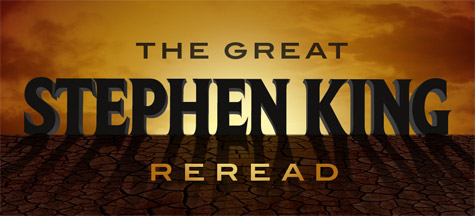Stephen King is such a part of the American cultural consciousness that there’s no point in debating his importance anymore: take it as a given and only waste your time if you’re trolling for traffic. But the tired old argument of whether his books are actually any good or not still twitches a limb from time to time, and—since I’m a big fan of beating a dead horse—I figured I’d re-read the first 10 years of Stephen King’s books and ask the timeless question: National Treasure or Total Crap?
I loved Stephen King when I was a kid. My gateway drug was a TV broadcast of The Shining caught in bursts when I was way too young, and I remember being hypnotized by the screaming-skull-and-neon-chrome cover of Christine that a friend’s mom was reading. I can’t remember the first book I actually read, but I think it might have been a copy of Different Seasons that one of my sisters left behind when she moved out, or maybe it was Night Shift. The Stephen King bug bit me at just the right time (13) and while a lot of kids measure their childhoods by Harry Potter, mine moved in units of Pet Sematary, Thinner, Skeleton Crew, and It.
And then, for reasons I’m still not quite sure of, I grew out of him. Maybe it was the long string of mediocre books he cranked out in the 90’s? Maybe it was the fact that every time I turned around there seemed to be a new Stephen King book in stores and so I started taking him for granted? Or maybe Stephen King is a writer who’s best appreciated by adolescents? Dunno. But it’s weird that he basically slipped my mind, because—good or not—Stephen King is super-important.
King took horror fiction mainstream, he turned being an author into being a rock star, he helped launch the horror boom of the 80’s, and he put Maine on the literary map. More importantly, he was a tireless advocate for blurring the boundaries between literary and genre fiction (a torch he lit and then passed on to Michael Chabon), and his books have resulted in two major American films (Carrie and The Shining) and a whole host of solid flicks (Stand By Me, Misery, Creepshow, Pet Semetary, The Dead Zone, The Shawshank Redemption).
Between 1974 (Carrie) and 1984 (Thinner) he was responsible for 20 books and I’m going to read them all. Well, sort of. I’m ignoring the ones he wrote under the psuedonym, Richard Bachman (Rage, The Long Walk, Roadwork, The Running Man), except for Thinner since it was essentially released as a Stephen King book when his pen name was exposed right after publication. I’m also ignoring his illustrated books and comic books (Cycle of the Werewolf, Creepshow), the first of his seven-volume Dark Tower books (The Dark Tower: The Gunslinger), his book of essays about horror (Danse Macabre), and his collaboration with Peter Straub (The Talisman). But don’t worry, that still leaves me with the classic King canon:
Carrie (1974)
’Salem’s Lot (1975)
The Shining (1977)
Night Shift (short story collection) (1978)
The Stand (1978)
The Dead Zone (1979)
Firestarter (1980)
Cujo (1981)
Different Seasons (four novellas) (1982)
Christine (1983)
Pet Sematary (1983)
Thinner (1984)
12 books, read over 12 weeks every Thursday morning (barring Thanksgiving). Since each book is about a zillion pages long, this is truly: Man vs. King! The first throwdown starts now with the soon-to-be-rebooted… Carrie.
Grady Hendrix has written about pop culture for publications ranging from Playboy to World Literature Today. He also writes books! You can follow every little move he makes over at his blog.










